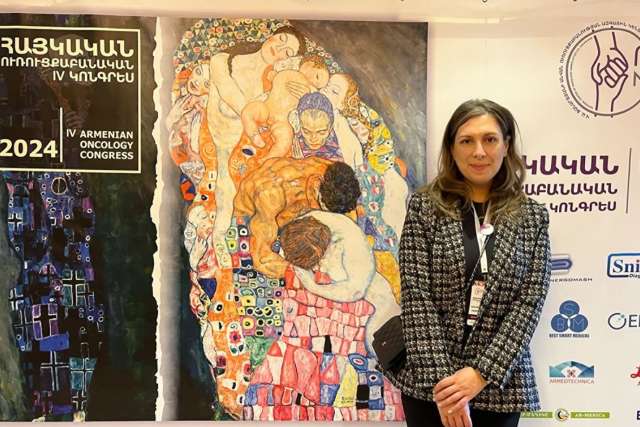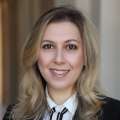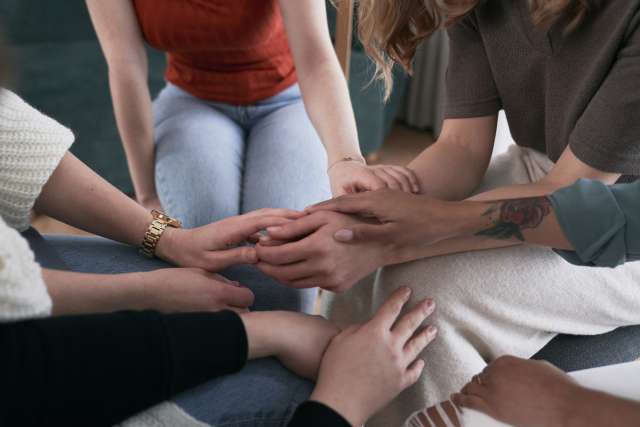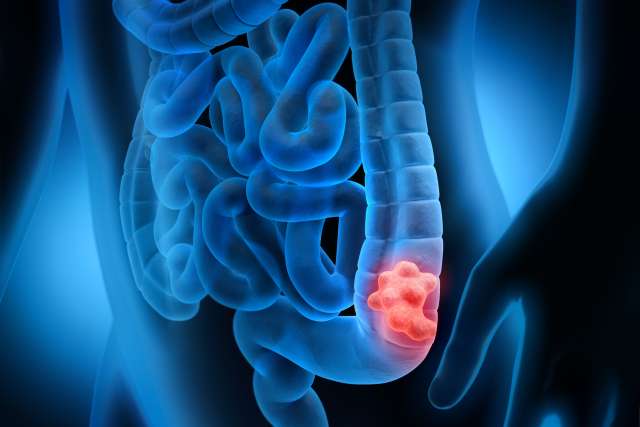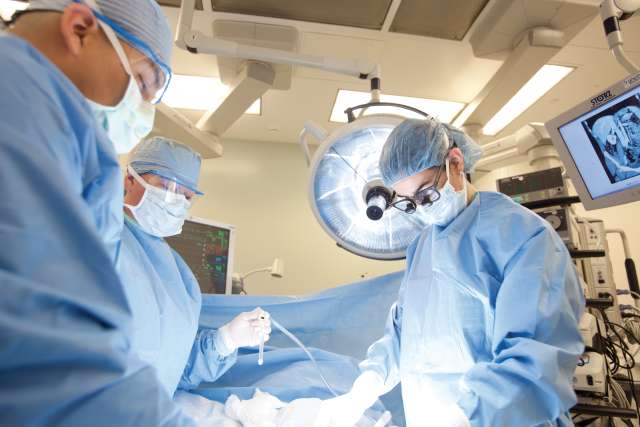For clinical psychologist Valentina Ogaryan, PhD, traveling to Armenia to speak about psychosocial oncology was more than an opportunity to discuss her work in her native tongue. It was an emotional homecoming to her birthplace and tribute to her father, who passed away in 2023.
“My father was instrumental in really shaping my identity as an Armenian woman,” says Dr. Ogaryan, clinical director of the Simms Mann UCLA Center for Integrative Oncology. “My parents immigrated to this country when I was only 1, and embraced making every opportunity to gain education, to contribute, to give back to our community. That was so important to him.”
As a guest of both the American Oncology Congress and the Fanarjyan National Center of Oncology in February 2024, Dr. Ogaryan was able to share her expertise in providing psychosocial care for people with cancer through her work with the Simms Mann Center, offering guidance to providers eager to expand mental health services for their patients.
Armenia lags behind the United States in its approach to mental health care, Dr. Ogaryan says. There are strong cultural stigmas around mental health needs, she says, and limited educational opportunities in psychology and psychosocial treatment.
“The fact that they brought me all the way from UCLA to the Republic of Armenia — which, by the way, it took me two days to get there — demonstrates not only their desire to collaborate and to learn, but also their desire of wanting to improve best practices,” she says.
Loss, grief and cancer
Dr. Ogaryan’s first lecture, at the Fanarjyan National Center of Oncology, was about grief and loss in the context of cancer. It’s a complex topic, she says, because of the country’s history of genocide.
“Loss is inherent to the Armenian identity,” she says.
She delivered the talk in Armenian to foster intimacy with the audience of health care providers and to honor the sensitivity of the subject.
“It was so meaningful and special for me to be able to talk about a topic in which I’ve received all of my training and education — in the U.S., of course — but to be able to translate that to my mother tongue,” Dr. Ogaryan says. “To be able to dialogue and discuss what it means to be an Armenian living in Armenia, touched by loss in every way — not only by cancer, but in every way, and then also by cancer.”
The Fanarjyan Center is the first cancer clinic in Armenia to offer psychosocial support services, Dr. Ogaryan says.
International experts
Dr. Ogaryan was one of two American guests at the Armenian Oncology Congress, which brings together international experts from various disciplines to share technological advances in cancer treatment, research breakthroughs and best practices in caring for cancer patients around the world.
At this conference, Dr. Ogaryan discussed how to support patients with “difficult personalities” — a lecture she has also given to colleagues at UCLA Health. Some people being treated for cancer “might be unskilled in the way that they express their emotions or the way that they regulate their emotions, which then will make it very complicated to provide optimal care,” she says.
For example, patients might distrust their diagnosis or doubt they actually have cancer, she says, which could be a sign of fear. It’s also not uncommon for some families of people with cancer in Armenia to keep a diagnosis from the patient, out of concern that the person will lose hope or not want to undergo treatment, Dr. Ogaryan says.
She offered providers helpful language to discuss a patient’s diagnosis and treatment trajectory, “and how to do all of that from a cultural humility lens, understanding the values that are inherent to an Armenian,” she says.
Coming home
Back in Los Angeles, Dr. Ogaryan feels renewed focus and gratitude for her mission of providing culturally congruent care to Simms Mann Center patients — speaking to them in their language, with sensitivity around their culture and experiences.
“Speaking in the patient’s language makes such a difference,” she says. “It not only makes a difference when you’re doing it colleague to colleague in a professional setting, but when you’re talking to a patient about their diagnosis and about what it means to have emotional distress.”
She’s proud that the Simms Mann Center offers care in Spanish, Vietnamese, Japanese and Armenian.
And Dr. Ogaryan is inspired by the expansion of psychosocial care in Armenia, despite cultural, budgetary and educational barriers.
“I felt honored and humbled to have the opportunity to come back to my home country where I was born and to be surrounded by like-minded colleagues who are incredibly invested in the field of psycho-oncology,” she says. “And it’s so meaningful to deliver these types of educational lectures and represent Simms Mann.”

